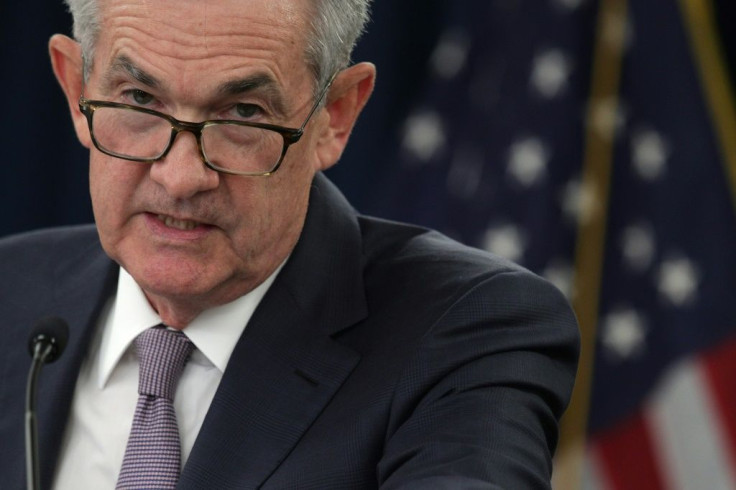Tuesday's Stock Market Noon: US Equities Drop Despite Emergency Rate Cut By Fed, 10-Year Yield Sinks

KEY POINTS
- The Federal Reserve cut interest rate by 50 basis points to the 1% to 1.25% range
- Stocks initially rose on news of rate cut, then declined again
- Australia, Malaysia central banks cut their interest rates
Update: 2:40 p.m. EDT:
U.S. stocks were plunging in late afternoon trading, as investors ignore or downplay a sudden rate cut by the Fed.
The Dow Jones Industrial Average plunged 827.06 points to 25,876.26 while the S&P 500 fell 88.86 points to 3,001.37 and the Nasdaq Composite Index tumbled 280.77 points to 8,671.39.
The yield on the 10-year Treasury fell below 1% at 0.949%.
Original story:
U.S. stocks were sharply lower in erratic trading at noon on Tuesday even though the Federal Reserve announced an emergency rate cut of 50 basis points to the 1% to 1.25% range in response to the threat from the coronavirus. The yield on the 10-year Treasury sank to another all-time intraday low of 1.031% as of 12 p.m.
The Dow Jones Industrial Average dropped 256.79 points to 26,446.53 while the S&P 500 fell 20.59 points to 3,069.64 and the Nasdaq Composite Index tumbled 52.59 points to 8,899.57.
In its statement the Fed said: “The fundamentals of the U.S. economy remain strong. However, the coronavirus poses evolving risks to economic activity.”
The central bank added that it “is closely monitoring developments and their implications for the economic outlook and will use its tools and act as appropriate to support the economy.”
In a subsequent press conference, Fed Chairman Jerome Powell said: “My colleagues and I took this action to help the U.S. economy keep strong in the face of new risks to the economic outlook. The spread of the coronavirus has brought new challenges and risks.”
However, the Fed’s move only deepened worries about the magnitude of the virus’ impact on economies.
“It’s great that the Federal Reserve recognizes that there’s going to be weakness, but it makes me feel, wow, the weakness must be much more than I thought,” said Jim Cramer of CNBC. “I’m now nervous. I’m more nervous than I was before.”
Earlier, the Group of Seven industrial powers and central bank chiefs issued a statement calling for a coordinated response to the effects of the coronavirus.
“We reaffirm our commitment to use all appropriate policy tools to achieve strong, sustainable growth and safeguard against downside risks,” G7 stated. "G7 finance ministers are ready to take actions, including fiscal measures where appropriate, to aid in the response to the virus and support the economy during this phase. G7 central banks will continue to fulfill their mandates, thus supporting price stability and economic growth while maintaining the resilience of the financial system.”
The Reserve Bank of Australia on Tuesday reduced its cash rate by 25 basis points to 0.5%, a new all-time low. This was the RBA’s fourth cut in less than a year. The central bank’s governor Philip Lowe stated the coronavirus outbreak has a “significant effect” on Australia’s economy and said the rate cut was designed to “provide additional support to employment and economic activity.”
Malaysia's central bank, Bank Negara Malaysia, cut its rates to 2.5%, a 10-year low, citing that the ongoing coronavirus outbreak “has disrupted production and travel activity, especially within the region."
Bank of England governor Mark Carney warned that coronavirus could lead to a "large" but "ultimately temporary" shock to the economy.
“Markets will have to decide if the promise of concerted and possibly coordinated action from fiscal and monetary authorities will be enough,” said James Athey, senior investment manager at Aberdeen Standard Investments. “For most shocks you would probably say yes, but the scale, magnitude and sheer unknowable nature of this one [coronavirus] makes that an open question.”
Overnight in Asia, markets finished mixed. China’s Shanghai Composite gained 0.74%, while Hong Kong’s Hang Seng slipped 0.03%, and Japan’s Nikkei-225 dropped 1.22%.
In Europe markets closed higher as Britain’s FTSE-100 gained 0.95%, France’s CAC-40 advanced 1.12% and Germany’s DAX rose 1.08%.
Crude oil futures gained 1.28% at $47.35 per barrel and Brent crude gained 0.77% at $52.30. Gold futures rose 2.9%.
The euro rose 0.24% at $1.116 while the pound sterling rose 0.56% at $1.2825.
© Copyright IBTimes 2024. All rights reserved.





















